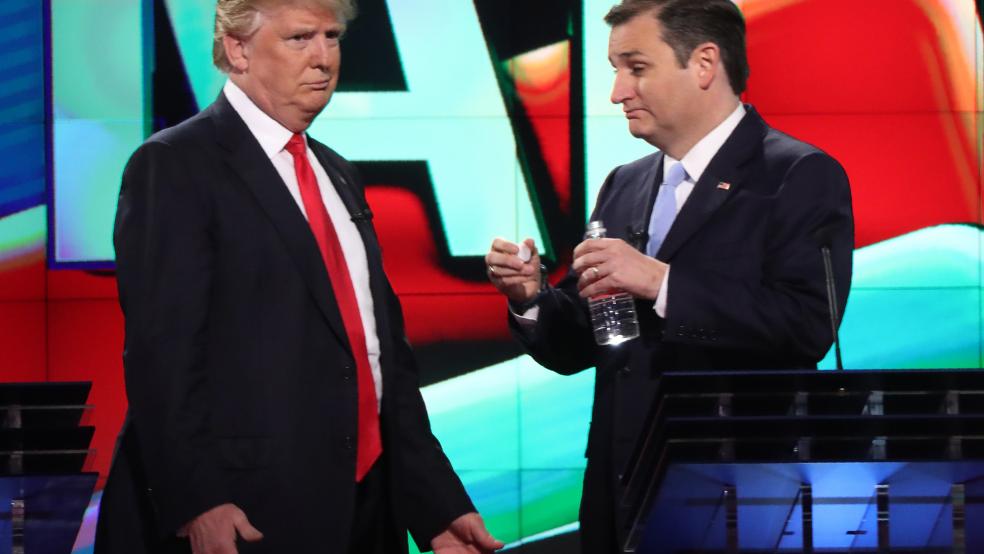For months, analysts and the candidates themselves talked about “lanes” in the Republican presidential nomination process. There was the Tea Party lane, the governors’ lane, the outsiders’ lane, and the so-called “establishment” lane.
Some still speak of lanes long after Donald Trump proved this artificial structure an illusion, mustering support from across the Republican base while the other “lanes” largely failed to materialize. The other factions in the GOP couldn’t get out of the others’ way and split the potential opposition to the populist billionaire well into the primaries.
Related: Forget Trump: Here's Who's Really Destroying the Republican Party
Jeb Bush epitomized the establishment lane. Long the choice of Republican donors and leadership, the former governor of Florida ended up as Trump’s main foil in his attacks on the present-day Republican Party. Trump ripped Bush for his brother’s presidency along the kind of attack lines usually seen from Democrats – blaming George W. Bush for 9/11 and accusing him of lying to get the US to invade Iraq – but also for being part of the same political establishment that lost two successive presidential elections and failed to deliver on its promises after two midterm election victories. Trump framed Bush as a “low-energy” candidate who would not fight ruthlessly for victory, and the impression stuck.
Despite this, Bush and his deep-pocketed allies aimed most of their attacks at others in the race until nearly the end of Bush’s campaign. Their main target was Marco Rubio, who began the race in the Tea Party lane, and they focused on his lack of experience and his Senate attendance record.
The attacks didn’t prove terribly effective. Chris Christie – another supposed “establishment” lane candidate – did much more damage by attacking Rubio’s repetition of attack lines in the debate prior to the New Hampshire debate. Both attacks showed the risk of electing a first-term Senator to the presidency, and made the argument against an experienced Republican hand on the rudder of state.
Related: If Trump Prevails, Conservatives Could Rip the GOP Apart
Bush and Christie dropped out of the race shortly afterward. Christie went from pushing the argument in support of the so-called establishment lane to backing Donald Trump, who has never been elected to public office. Bush followed that up on Wednesday by endorsing Ted Cruz, who has two fewer years in the Senate than Rubio, and unlike Rubio had never held elective office prior to 2012. Both men ignored the last two-term governor standing, Ohio’s John Kasich, who would otherwise represent everything both men had presented as virtues about themselves during the entire arc of the race.
Of the two, Bush’s endorsement carries much more significance. Christie has a track record in Republican leadership, but the Bushes have been part of that “establishment” for decades, all the way back to Sen. Prescott Bush during the Eisenhower-Kennedy years. Two of the clan won the presidency, and both George and Jeb won two terms as governors in their states as well. And Bush didn’t position his support of Ted Cruz as merely a strategic move to deny Trump enough delegates for the nomination, but a full-throated endorsement of the Tea Party outsider’s candidacy.
“I wanted you all to be the first to know that today I am endorsing Ted Cruz for President,” Bush wrote. “Ted is a consistent, principled conservative who has demonstrated the ability to appeal to voters and win primary contests, including yesterday’s Utah caucus.… Republicans can win back the White House and put our nation on a path to security and prosperity if we support a nominee who can unite our party.”
Related: This Is What the GOP’s Surrender to Trump Looks Like
Those who have followed Cruz’ career in the Senate will find the Bush blessing a marvel to behold. Just a few days earlier, Senate Republicans had publicly suggested that Cruz needed to kiss Senate Majority Leader Mitch McConnell’s ring and apologize for calling McConnell a “liar” to get the party behind him. Lindsey Graham had joked in February that one of his colleagues could murder Cruz on the Senate floor and avoid being convicted. No one in politics has been more disliked by his own party’s leadership, and that includes Donald Trump.
The Washington Post’s Chris Cillizza rightly notes that this endorsement – and those of others, including Graham – may not be explicitly strategic, but that is the intent. “The lining-up behind Cruz is solely aimed at trying to stop Trump from getting to 1,237 delegates before the Republican National Convention,” Cillizza writes, in the hope that “the Texas Republican, having served his purpose by keeping it from Trump, will be replaced by a more palatable alternative like, say, Kasich.”
That may be the intent, but that doesn’t describe the impact that Bush’s bombshell represents. For the first time, Republican leadership has acknowledged that they cannot control the outcome of intramural contests, and that the energy and the momentum of the Republican Party has escaped their grasp. Whether they will admit it or not, the endorsement of Ted Cruz and the use of him as a rally point to oppose Trump passes the baton to movement conservatives and the Tea Party as the new arbiters of Republican politics.
Related: For the GOP, the Price of Stopping Trump Is Losing to Clinton
That in itself is a sea change in the GOP, especially since for many of those rallying to the cause now, Cruz represented the dangers of the same conservative consistency that Bush hailed in his endorsement.
The only question now is whether the pass of this baton comes too late. Donald Trump and his supporters didn’t wait for a baton – they seized the momentum themselves and marginalized the donor and leadership class. The fight down to the convention will be more than just about a nomination. It will determine the identity of the Republican Party for a generation to come, and decide who will take the reins as the new establishment.






